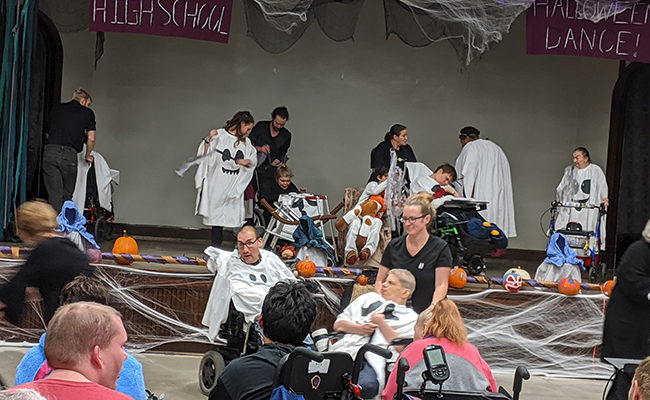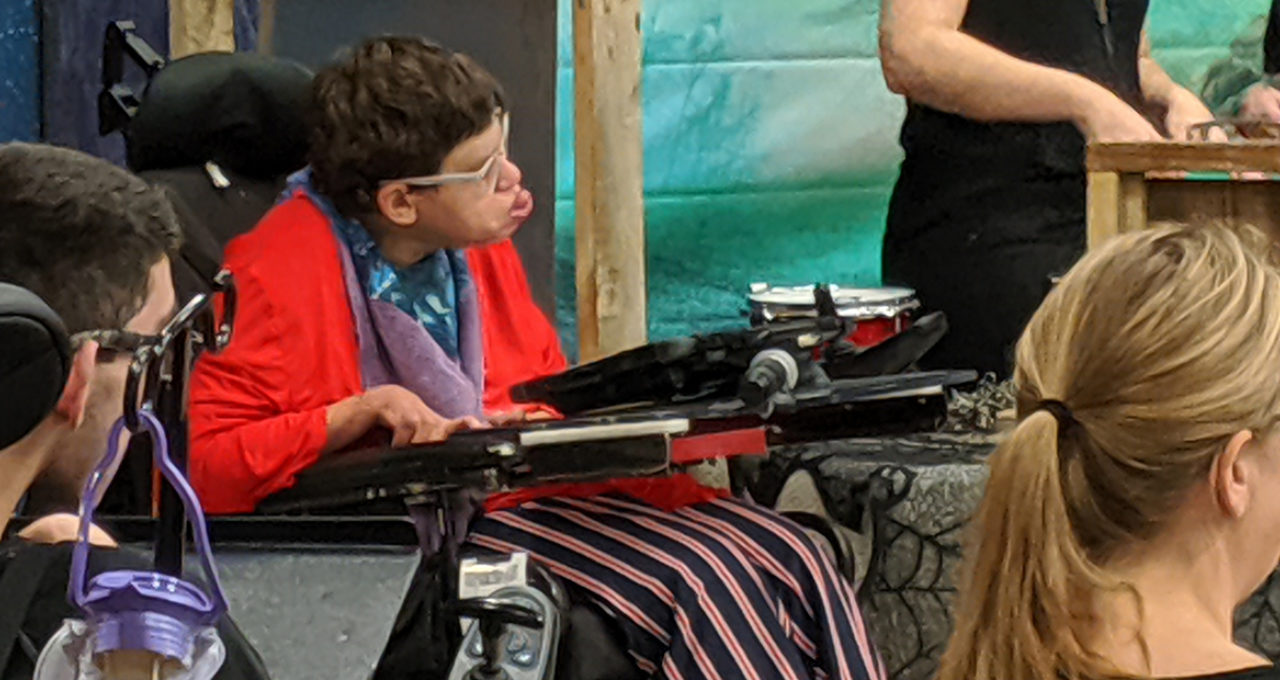Latest News
Opening Doors Through the Performing Arts

Community Foundation Grant Creates Opportunities for Those with Disabilities to Participate in Theatre
* * *
Shelby Roberts is in her 40s, although she doesn’t look it. She has short brown hair and wears glasses. Those who know her call her witty, creative and funny — even opinionated.
Shelby Roberts is just like you and me. Only her life is a thousand times more complex; a thousand times more difficult.
Shelby cannot walk or speak. To communicate with others, she types her thoughts into a Dynavox machine, a device placed on her electric wheelchair that translates her keystrokes into recognizable speech.
It goes without saying that for Shelby, every minute of every day brings about a new challenge, a new obstacle.
But last fall, thanks in part to a grant from the Sioux Falls Area Community Foundation, Shelby got the chance to leave her challenges behind and live, for a short time, within the magic of the stage and between the lines of the great William Shakespeare.
Shelby and others who participate in programs at DakotAbilities are part of a new program created by the Black Hills Playhouse that’s designed to help people with disabilities improve their health, well-being and independence through the performing arts. The initiative is supported by a grant from the Community Foundation.
Kevin Earlywine is a program coordinator for the Black Hills Playhouse Education Department. He directed last fall’s “A Bewitching Halloween,” a theatre class held at DakotAbilities’ Longfellow Center that featured adapted productions of Shakespeare’s “Romeo and Juliet” and “Charlie Bob Meets the Ghosts of Longfellow,” a play written by Roberts.
The experience, he said, was “life-changing” — not only for the DakotAbilities participants who played roles in each production, but also for those in the audience.
“We’re really striving to strengthen communication and memory skills. What we’ve seen is that in learning about theatre, people build independence skills they never had before. Many of our cast members are non-verbal and many are in wheelchairs — participating in a theatre production gives them the opportunity to make choices and have options like they’ve never had before.”
— Kevin Earlywine, Program Coordinator, Black Hills Playhouse Education Department
Opening Doors
Patrick Gale serves as the Community Foundation's vice president for community investment. He called the chance to support a program that creates new opportunities and teaches new skills a win-win.
“Here, we often say that the arts have the power to unite us and inspire us. When we looked at this program, we saw the arts as a catalyst for so much more — as something that could open doors and remove obstacles for those with disabilities,” Gale said. “While participants of this amazing program are learning new skills and building new levels of independence, those of us who have the privilege of watching these productions come away with new a understanding and a deeper awareness of the connections we all share. We’re honored to support this important program with a grant from our Community Fund.”

Seeing Opportunity Through a Different Lens
When it comes to casting mainstream theatre productions, Earlywine said there’s always a fear those with disabilities or developmental challenges will be overlooked because of the time it takes to adapt a show to their individual needs.
But thanks to the grant from the Community Foundation, the Black Hills Playhouse team can build shows that embrace each cast member.
It’s still storytelling — just in a different way, he said.
To plan for each production, Earlywine said Black Hills Playhouse staff begin by adapting the show to fit the abilities of the cast.
“Before the production begins we’re given cast sheets so we have a chance to get to know each actor and learn how each actor likes to communicate,” he said. “From there, we examine the vocal needs of each show. For ‘A Bewitching Halloween’ we had nine actors who were non-verbal, so we needed to pair voice actors with them. Then we mixed and mastered voice performances so that when they’re acting, our stage actors can push a button and a voice will come out of the sound system. Some actors prefer to not hit a button and look at the sound operator to cue their line and some actors prefer to communicate their lines through different visual aids or sign language. It really is up to the actor and we honor that.”
The approach looks at theatre “through an entirely different lens,” Earlywine said.
“This is giving opportunity to an entire demographic that would not get this opportunity otherwise. It’s easy to tell people with disabilities they can’t participate in theatre. Not anymore. We’re instilling a new independence, teaching new skills, creating new experiences and opening new doors these individuals would otherwise not have access to,” he said.
The program is impacting more than just those with disabilities, Earlywine said. Audience members are learning new skills as well.
“I think people have become accustomed to seeing things in a certain way and this is storytelling in such an unorthodox way. In our production of ‘Romeo and Juliet,’ our Romeo was in a wheelchair, so he had to take a lift up to the balcony to meet Juliet,” he said. “I could see the audience members embrace the patience they needed to wait for that moment. I could see their acceptance. It was amazing.”
‘A Transformative Experience’
Joe Dvorak serves as director of day services for DakotAbilities, a nonprofit dedicated to serving people with disabilities throughout South Dakota. The organization serves individuals ranging from age 16 to 80 and beyond.
Dvorak said watching the Black Hills Playhouse team work with those who participate in programs at DakotAbilities has been inspiring to watch.
“For folks who have never had an opportunity to participate in theatre — to have the chance to get up on a stage and use whatever communication skills they have, to memorize lines, develop a character, learn movements and facial expressions and work through rehearsals — it’s a transformative experience.”
— Joe Dvorak, Director of Day Services, DakotAbilities
“The last production featured actors with autism, cerebral palsy and a host of other medical conditions that make life really challenging — this was a chance for these folks to experience something completely new and learn valuable skills. It’s just been wonderful.”
Up Next
Coming up, the Black Hills Playhouse and DakotAbilities will present “Cinder … Really — the True Story of Cinderella,” in March.
